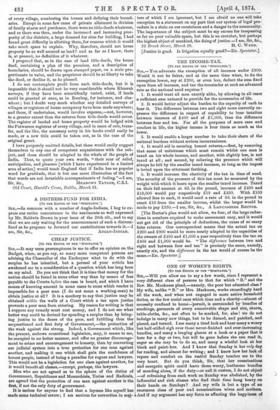THE INCOME-TAX.
[TO THE EDITOR OF THE "SPECTATOR.") SIR,—You advocate the exemption of all incomes under £300. Would. it not be fairer, and at the same time wiser, to fix the exemption lower, say at £200, or even less, deduct the sum fixed upon from all incomes, and tax the remainder at such an advanced rate as the national need requires?
1. It would treat all men exactly alike, by allowing in all cases a sufficient sum untaxed to provide for the necessaries of life.
2. It would better adjust the burden to the capacity of each to bear it. The difference between two and eight more correctly ex- presses the difference in respect of capability to bear taxation between incomes of £400 and of 11,000, than the difference between four and ten. For all the purposes of mere ease and comfort in life, the higher income is four times as much as the lower.
3. It would enable a larger number to take their share of the national burdens without serious inconvenience.
4. It would aid in securing honest returns,—first, by removing that sense of unfairness which must remain whilst one man is taxed on his whole income, and another, with slightly less, is not taxed at all ; and second, by relieving the pressure which will always be felt by the smaller taxed incomes, so long as the impost is levied upon the uttermost farthing.
5. It would increase the elasticity of the tax in time of need.
The severity of the pressure of this tax must be measured by the weight with which it bears upon the smaller taxed incomes. Taxed on their full amount at 6d. in the pound, incomes of £400 and £10,000 would pay respectively £10 and £250. With £100 allowed free to each, it would need a rate of 8d. in the pound to exact £10 from the smaller income, whilst the larger would be made to pay £330.-1 am, Sir, &e., A LANCASHIRE RECTOR.
he Rector's plan would not allow, we fear, of the large reduc-
tions in numbers required to make assessment easy, and it would not get rid of the principle of deductions, the cause of so many false returns. Our correspondent means that the actual tax on £200 and £800 would be more nearly adapted to the capacities of the owners of £400 and £1,000 a year respectively than the tax on £400 and £1,000 would be. "The difference between two and eight and between four and ten" is precisely the same, namely, exactly six, and the difference in the tax would of course be the same.—En. Spectator.]


































 Previous page
Previous page